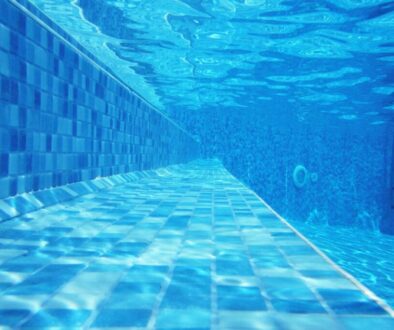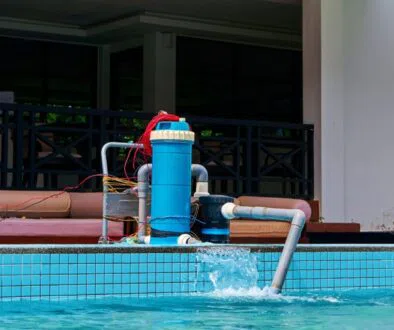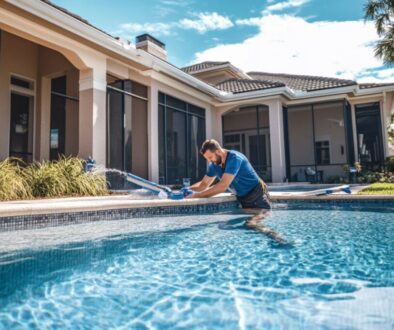10 Best Non-Toxic Chlorine Alternatives for Your Pool
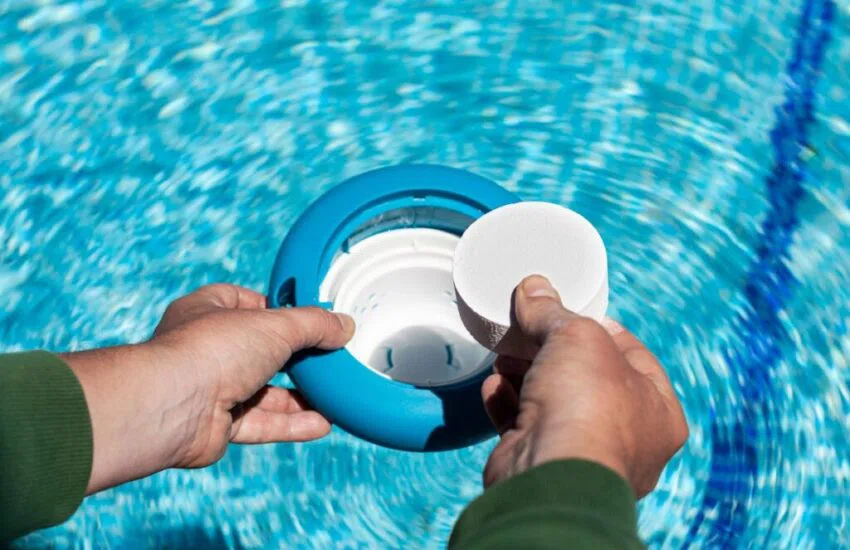
Published May 4, 2025
Looking for chlorine alternatives for your pool that are safer for your skin, lungs, and the environment? You’re not alone. Many pool owners are searching for healthier options that still get the job done, without the harsh side effects of traditional chlorine.
From itchy skin to red eyes and that strong chemical smell, chlorine can take the joy out of pool time. The good news? There are non-toxic, effective alternatives to chlorine for pool sanitation.
In this guide, we’ll dive into the best chlorine alternatives for swimming pools, natural, powerful, and kinder to your health. Let’s make your pool a safer splash zone.
1. Salt Water Systems
Saltwater pools may sound like a total break from chlorine, but they actually generate it naturally through electrolysis. The key difference? It’s softer on your skin, eyes, and lungs.
You won’t get that harsh chemical smell, and maintenance becomes easier over time. Many homeowners love that salt systems reduce harsh chemical handling and cut long-term costs. Still, be aware: salt can be corrosive to pool surfaces and equipment if not managed correctly.
It’s a great choice for those wanting a more spa-like swim, without the constant chemical balancing. Think of it as chlorine, only friendlier and less intense.
2. Bromine
If you’re tired of that strong chlorine scent and skin irritation, bromine might be your match. Commonly used in hot tubs and indoor pools, bromine sanitizes water while being gentler on skin and eyes. It doesn’t break down as fast as chlorine in heat, but it struggles outdoors, sunlight weakens its power.
And yes, it’s pricier. Bromine lingers longer in water, which means fewer touch-ups but also less control if levels go off balance. For indoor or covered pools, bromine gives you peace of mind, without the red eyes or bleachy hair.

3. Ozone Systems
Ozone might sound futuristic, but it’s simply supercharged oxygen. Ozone generators pump this gas into your water to break down bacteria, viruses, and organic gunk. It works fast and is incredibly effective, but here’s the catch: ozone doesn’t stick around.
It needs a sidekick like chlorine or bromine to maintain residual sanitation. The upside? You’ll use up to 90% less chlorine overall.
Think of ozone as your secret weapon for ultra-clean water, best when paired with a steady sanitizer. Installation isn’t cheap, but for pool owners serious about health and hygiene, it’s a smart long-term investment.
4. Mineral Pool Systems
Mineral systems simplify your pool care while cutting chlorine use in half. These cartridge-based setups infuse your water with natural sanitizing minerals like silver and copper. As water flows through the chamber, it kills bacteria and blocks algae growth.
The result? Clean water with far less chemical odor. Brands like Pool Frog and Nature2 make it easy to attach these systems to your pool plumbing.
Just know that you’ll still need a small amount of chlorine or another sanitizer. It’s not a total replacement, but it’s a massive improvement. Bonus? It’s low maintenance and great for sensitive skin.
5. Non-Chlorine Shock
Think of non-chlorine shock as a deep cleanse for your pool. Instead of using chlorine to “shock” your water and break down waste, this oxygen-based option removes oils, sweat, and sunscreen without irritating your body. It works fast and clears up cloudy water without the usual side effects.
While it’s not a stand-alone sanitizer, it’s an excellent complement for bromine or mineral systems. For indoor pools and spas, non-chlorine shock is especially popular. Want your pool to feel fresh and sparkling without the harsh chemical after-smell?
This is your go-to solution for clarity and comfort.
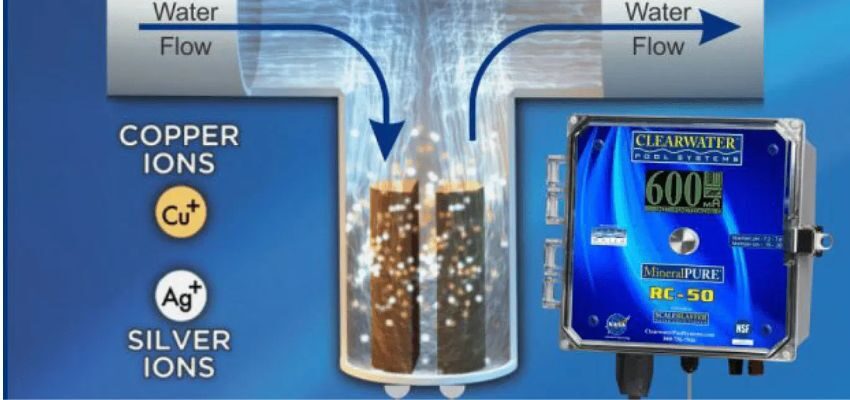
6. Ionization
Copper and silver have long been known for their antimicrobial properties, and ionizers bring that power to your pool. These systems release charged metal ions that bind to bacteria and algae, making them easy to filter out. The result?
Significantly less chlorine is needed, and sometimes none at all. Ionizers are ideal if you want a mostly chemical-free pool. However, they do require moving water to stay effective, and some backup sanitizer might still be necessary.
For those serious about reducing chemicals without sacrificing sanitation, ionization is a standout, science-backed solution with ancient roots.
7. PHMB
PHMB (polyhexamethylene biguanide) is the only option on this list that completely ditches chlorine. It’s stable in sunlight, gentle on the skin, and doesn’t require a stabilizer. Brands like Baquacil promote it as a smooth, non-irritating alternative.
How does it work? PHMB ruptures bacteria cell walls, then wraps the debris in a gel that sinks for vacuum removal. It sounds high-tech, and it is. You’ll need hydrogen peroxide as an oxidizer and monthly filter cleanings.
Also, switching from chlorine means draining your pool. But if you want zero chlorine and a softer swim, PHMB is your best bet.
8. Ultrafiltration
Ultrafiltration uses fine membranes to remove nearly all bacteria, viruses, and particles from your water, without relying on harsh chemicals. Water is circulated at low pressure through tiny pores that trap even microscopic debris. It’s like giving your pool water a high-end spa facial.
This system is perfect for those seeking ultra-clean water without constant chemical dosing. However, it’s pricey and typically used in high-end or commercial setups. Still, as tech improves, it may become more accessible for everyday pool owners.
f you want clean, clear, chemical-free water, this is the gold standard.
9. UV Light
UV light systems disinfect pool water by exposing it to ultraviolet rays that destroy bacteria and viruses. It’s a chemical-free method that reduces your need for chlorine dramatically. That means fewer chloramines, less odor, and happier swimmers.
But UV has limits, it doesn’t leave a lasting effect in the water. So, you’ll still need some backup sanitizer to keep things clean between cycles. For eco-conscious pool owners, UV light is a fantastic add-on that enhances safety while cutting down on irritants.
It’s modern, effective, and getting more popular every year.
10. Lowering Water Temperature
Believe it or not, cooler water can actually help maintain pool cleanliness. Bacteria and algae thrive in warm environments, so lowering your pool’s temperature can slow their growth. This means you’ll use fewer chemicals to stay clean.
Covering your pool during hot days or turning off heat sources can make a surprising difference. While it won’t replace chlorine entirely, it’s a natural way to reduce chemical load. The drawback?
Some swimmers may find cold water uninviting. Still, as part of a broader strategy, cooler water is a small tweak with big benefits.
FAQs
What is a good substitute for chlorine in a pool?
A good substitute is a saltwater system. It cleans the pool like chlorine but feels gentler on your skin. Other chlorine alternatives for pool care include bromine, ozone, and mineral systems.
What is the safest chlorine for a pool?
Salt-generated chlorine is the safest. It uses less harsh chemicals and is softer on the eyes and skin. It’s a popular choice for families.
Is there a way to keep a pool clean without chlorine?
Yes! There are natural alternatives to chlorine for pool sanitation like PHMB, ionizers, and UV light. These help clean your pool without strong chemicals.
Can I use Clorox in my pool instead of chlorine?
Regular Clorox isn’t made for pools. It’s better to use real pool chlorine or other safe chlorine alternatives for swimming pool use.
What can I add to my pool for free chlorine?
You can add liquid chlorine or pool shock to raise free chlorine levels. If you’re using alternatives for pool chlorine, check your system’s guide first.
Final Thoughts
Chlorine may keep pools clean, but too much of it can cause skin, eye, and breathing problems. The good news is there are many chlorine alternatives for pools that work just as well. Options like salt water, ozone, UV light, and mineral systems can help you swim safely without strong chemicals.
Some even feel better on your skin and are easier to care for. Whether you want to use less chlorine or none at all, there’s a solution that fits your needs and budget. Need help making the switch? Excel Pool & Patio Solutions is here for you.
Hire Boca’s Favorite Pool Builders
Excel Pool and Patio Solutions is your trustworthy provider of pool services in Boca Raton. We are experts in pool and patio remodeling and can handle your resurfacing needs as well. Our technicians are vetted and trained for your guaranteed satisfaction. Get to know us by browsing our website or reaching out to us with any questions.
Contact our team today to request a free estimate for pool construction, maintenance, repairs and more.
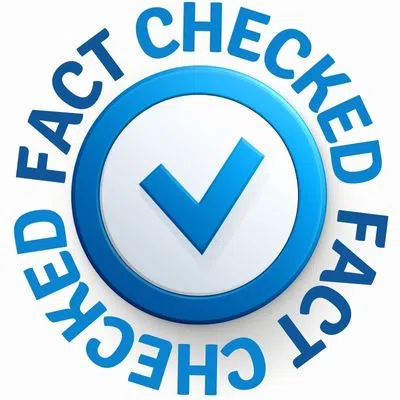
Fact Checked By Experts
This is original content and has been diligently fact checked by our internal team of experts. Discover more about the rigorous editorial standards we uphold for our website here.

About The Author
Meet Rei Bayucca, a seasoned writer with extensive expertise across multiple industries. Her mission is to captivate and enlighten readers with insightful and masterfully-written articles that both inspire and inform.

